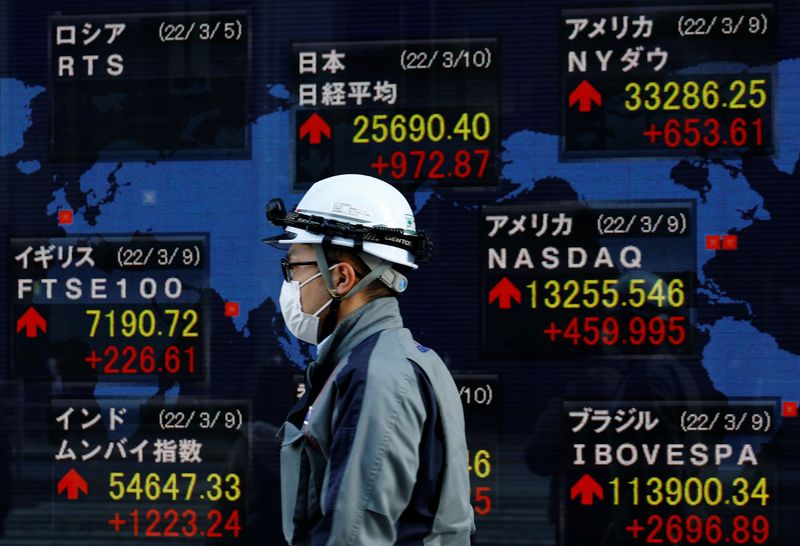By Makiko Yamazaki
TOKYO (Reuters) - A rising wave of shareholder activism has turned Tokyo into a growth market for businesses that offer advice on shareholder relations, as corporate Japan scrambles for help to deal with investors who are no longer silent.
The growing presence of such advisers, including new entrants, shows how Japanese companies are more actively addressing concerns about weak governance, poor allocation of capital and chronic stock underperformance - even those that have not yet been targeted by activists.
With about half of its companies trading below their book value, Japan has become one of the world's most popular destinations for activists looking for targets with big potential for change. A government push for governance reform is adding to the momentum.
The experience of conglomerate Toshiba (OTC:TOSYY) Corp is on the minds of many Japanese bosses. At that company, activist shareholders have forced board changes, rejected the management's turnaround plan and prompted the company to consider going private to remove them.
Law firms and investment banks such as Nomura Holdings (NYSE:NMR) have typically advised companies on how to defend themselves from activist campaigns as part of their mergers-and-acquisitions advisory businesses. Shareholder relations advisers do that, too, and they say they are generally more focused on longer-term strategies.
Typical work for them includes identifying shareholders so the company can gauge support at general meetings, soliciting proxies and advising on strategic reviews including how to allocate capital.
"It's hard to ignore demands from activists nowadays, as their focus has shifted from quick returns to more fundamental issues, such as business strategy and governance," said Manabu Shinohara, partner at EY's strategy consulting unit in Japan.
EY announced a foray into shareholder relations in Japan in December, with a full-service line-up from identification of shareholders to proxy solicitation. EY aims to boost its 20-member team to 100 in a few years.
The number of activist funds operating in Japan has jumped more than fivefold since 2014 to about 50, now including such global names as ValueAct Capital and Elliott Management, according to data from Mizuho Trust & Banking Co.
Shoya Okuma, chief executive of shareholder-relations firm QuestHub, said more companies that wanted to avoid war with activists were calling his firm for help in compiling strategies to boost shareholder value.
"Widely reported proxy fights like the one at Toshiba have turned many companies serious about shareholder value," he said. His five-year-old company now has nearly 20 staff members, with a plan to double that number in about three years.
BANKS EXPANDING
Top Japanese trust banks also have been aggressively expanding into this field of business by leveraging their client base for traditional shareholder record-keeping services as share transfer agents.
Sumitomo Mitsui (NYSE:SMFG) Trust Bank Ltd planned to increase the number of its shareholder-relations experts from the current 20 to around 30 in the long term, while Mizuho Trust hoped to eventually double the size of its 15-member team, the banks said.
Mitsubishi UFJ (NYSE:MUFG) Trust and Banking Corp said it would continue to expand its shareholder-relations support unit, Japan Shareholder Services Ltd (JSS), which now has about 80 staff members.
Big global firms are also looking to ramp up in the Japanese market.
One, Morrow Sodali, launched its own Tokyo office in 2021 after years of working with local partners. Christian Sealey, the company's international CEO, said Morrow Sodali could be poised to grow "very quickly" in Japan, which he said had "all the hallmarks" of the most interesting markets.
Another, Georgeson, believes "there is more to do in Japan," Cas Sydorowitz, its global CEO, said.
Some of the companies interviewed for this story said their latest expansions had been helped by shareholder relations experts joining from the local industry's dominant operator, IR Japan, and by some clients switching from it.
IR Japan, which had grown quickly on a rise in proxy fights, suffered from scandals last year, including alleged insider trading by a former executive.
IR Japan declined to comment on competitors, but executive vice president Akinosuke Ishigaki said: "It's our responsibility as an industry leader to continuously update our advisory capabilities and provide innovative services to our clients."
There are no public estimates of the size of the market, but Eiji Yamada, executive principal at The Japan Research Institute, said the boom could be transitory.

"Once companies master the language of capital markets and can convince shareholders of their strategies, they won't need to fully rely on outside support," he said.
Tsuyoshi Maruki, who heads Japanese activist fund Strategic Capital, urged advisory firms to focus on increasing their clients' shareholder value instead of protecting management. "Their advisory fees are paid from shareholders' assets," Maruki said.
